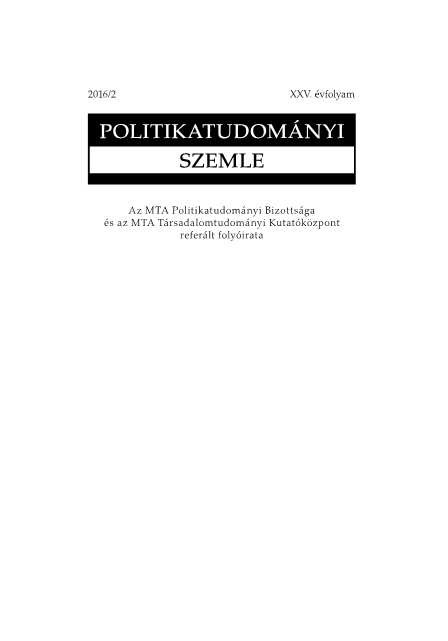Az önmediatizáció jelensége az online politikai kommunikációban
The Phenomenon of Self-Mediatisation in the Online Political Communication
Author(s): Norbert MerkovitySubject(s): Politics / Political Sciences, Media studies
Published by: MTA Politikai Tudományi Intézete
Keywords: Political communication; self-mediatisation; comparative study; parliamentary representatives; Westminster countries; Continental countries
Summary/Abstract: Analysing the use of social networking sites in the world of politics is an opportunity to learn the relationship between politicians’ communication and mediatisation. Mediatisation – which is referred to by some researchers as a “still unfolding historical project” (Livingstone, 2009: 7) – is a complex phenomenon, and a tool in the hands of politicians (Brants et al., 2010; Stromback, 2008). The mainstream of the European school typically interprets the theoretical foundations of the concept, however, by doing this we lose the possibilities of practical examination of mediatisation. The empirical research presented in this study is intended to prove that politicians are able to ‘domesticate’ the process of mediatisation on social networking sites, and while they are doing this they create the phenomenon of self-mediatisation. With the content analysis of 53 381 Facebook and Twitter posts I compared the communication of parliamentary representatives of ten countries in the article. The following countries are involved in the project: Australia, Austria, Croatia, Canada, Hungary, Ireland, Montenegro, Switzerland, New Zealand, and the United Kingdom. The outcome of the research explains politicians’ self-mediatisation through self-broadcasting. The results of the comparative study also provide opportunity for further observation. One observation is the similarities and differences between the analysed countries’ parliamentary representatives. I reveal the common denominator of politicians who are using social networking sites. The limits of the research do not allow to fully explain the quality and characteristics of online political discourse. However, it is able to outline the trends that defi ne politicians’ communication on social networking sites, and which may be an important starting point for future research carried out on the same subject.
Journal: Politikatudományi Szemle
- Issue Year: XXV/2016
- Issue No: 2
- Page Range: 111-132
- Page Count: 22
- Language: Hungarian

